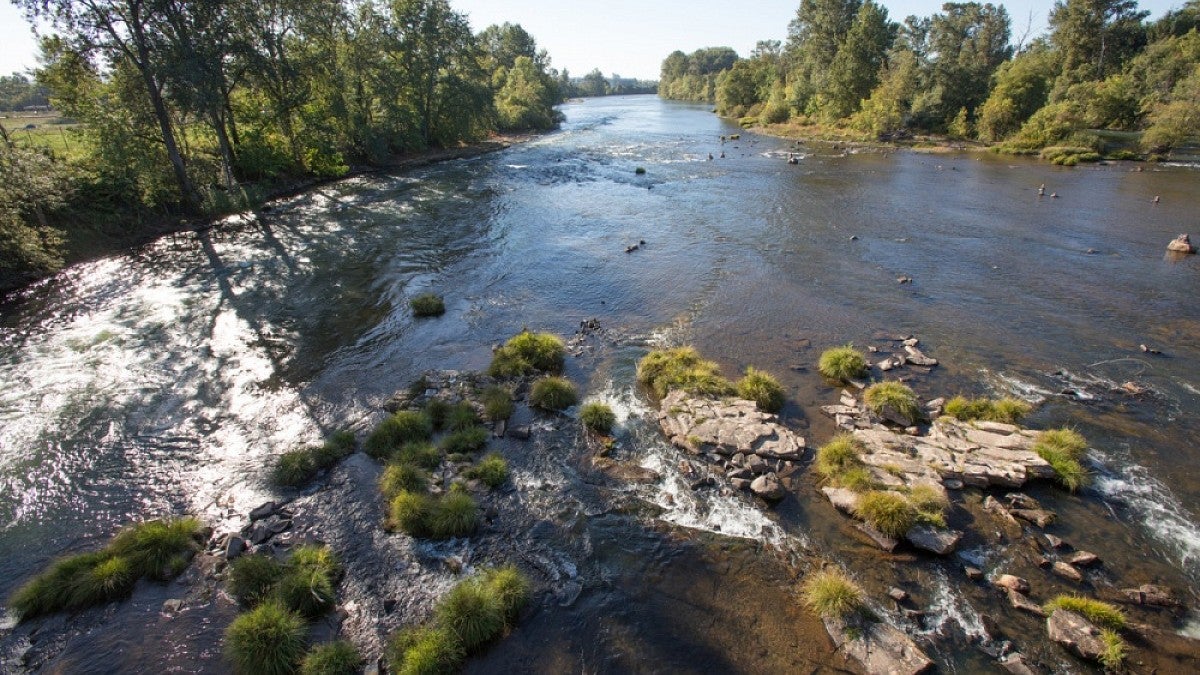Editor's note: Events mentioned in this story have been canceled. Please check the Year of Water website for rescheduled and future events.
This month marks the official kickoff of a yearlong initiative to draw attention to one of Oregon’s most important resources: water.
The Year of Water is a joint effort by the University of Oregon, Oregon State University and Portland State University to highlight the role Oregon’s research universities play as leaders and partners trying to address water-related challenges in Oregon, the region and the world.
The initiative, which runs through February 2021, provides the public a chance to learn more about research that takes place across Oregon and for UO researchers and scholars to discover what their colleagues at other universities are up to. Organizers say it could inspire new interdisciplinary collaborations that cut across institutional lines.
“So many of us are doing important work around water without being fully aware of what our colleagues in other departments and at other Oregon universities are up to,” said Alaí Reyes-Santos, a professor in the Department of Indigenous, Race, and Ethnic Studies and an organizer of the event. “The Year of Water opens the door for all Oregonians to see the critical research and scholarship that goes on throughout the state in labs, libraries and in the field.”
While some UO faculty members have clear ties to water — earth scientists who study glaciers, for example or biologists who study fish — other connections are less obvious. In Reyes-Santos’ case, the study of water is more cultural than literal. Her manuscript-in-progress, “Oceanic Whispers, Secrets She Never Told,” examines restorative justice and community healing through a black Caribbean lens.
Reyes-Santos points to the UO’s depth of environmental humanities researchers who are exploring water-related subjects, including those at the UO’s Center for Environmental Futures, not to mention researchers and scholars in English, theater, art and design, earth sciences, chemistry, biology, and more. A few of the UO faculty members involved in the initiative include:
- UO theater arts professor Theresa May, who developed a play to express the essential spiritual and cultural role of salmon in tribal life. The book “Salmon is Everything: Community-Based Theater in the Klamath Watershed” includes the script of the play and essays from collaborators.
- Heather Brinton, director of the Environmental and Natural Resources Law Center at the UO who administers seven interdisciplinary projects, including the Oceans, Coasts, and Watersheds Project to explore cutting-edge issues in both marine and freshwater environments.
- Stacy Alaimo, who researches and teaches across the environmental humanities, science studies, animal studies, American literature, cultural studies and critical theory. Her many publications include the book “Exposed: Environmental Politics and Pleasures in Posthuman Times,” which reveals some of the ways the state of the planet in the 21st century have radically transformed ethics, politics and what it means to be human.
Throughout the year, UO faculty members will have opportunities to showcase their research and scholarship around water and to network with colleagues. Upcoming events include:
- Year of Water Faculty Club event from 5 to 8 p.m. April 16 at the Jordan Schnitzer Museum of Art. The meeting will feature news, updates and chances to collaborate and brainstorm with other faculty members. The Year of Water event is open to all UO statutory faculty: tenure-track, career nontenure-track and officers of administration tenured in an academic department.
- Humans and the Coast series, organized by the UO Department of History. This interdisciplinary speaker series focuses on the interactions between humans and coastal regions. The next talk will be at 3:30 p.m. Wednesday, April 1, in Room 245, Erb Memorial Union and is free and open to the public. The speaker and topic have yet to be announced.
- A Quack Chats pub talk Wednesday, April 22, with Dave Sutherland, an oceanographer in the UO’s Department of Earth Sciences who will discuss his research examining how the ocean affects ice-covered areas such as Greenland, Antarctica and the Arctic Ocean. The talk will begin at 6 p.m. at Ax Billy Grill at the Downtown Athletic Club in Eugene. It is free and open to the public. Beverages and snacks can be purchased separately.
To see the complete list of upcoming events, visit the Year of Water website.
—By Denise Silfee, Research and Innovation


